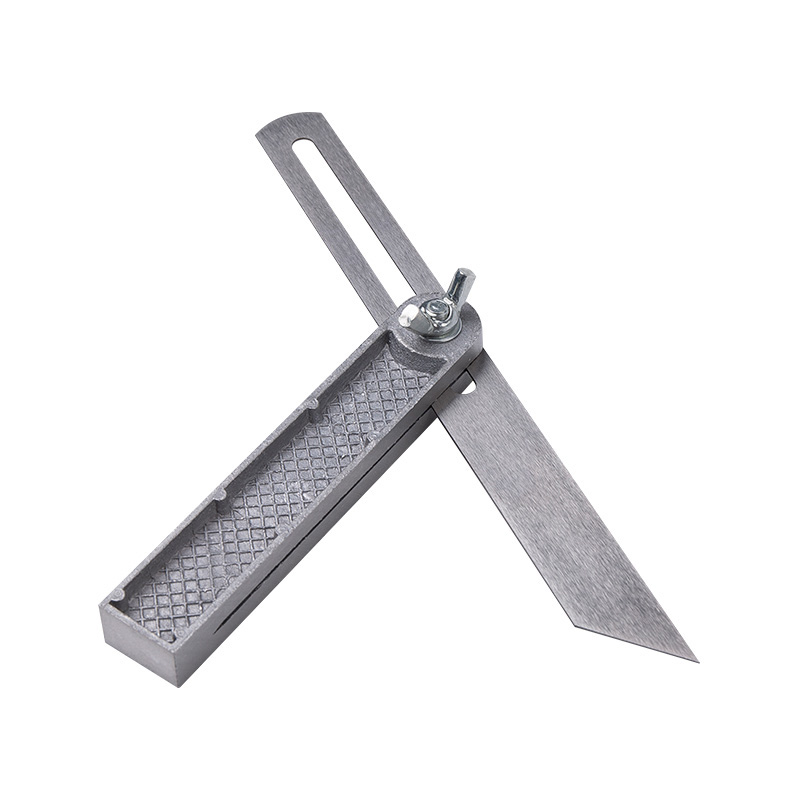The sliding T-bevel offers several advantages over other angle measuring tools, making it a preferred choice for specific woodworking and metalworking tasks. Here are some of its key advantages:
Versatility: Woodworking: Sliding T-bevels shine in a multitude of woodworking applications, from crafting complex joinery like compound angles for staircases to creating intricate designs in custom furniture. Their adaptability caters to the diverse needs of woodworkers engaged in both traditional and contemporary projects.
Metalworking: In the precision-driven realm of metalworking, sliding T-bevels prove indispensable for tasks such as fitting and aligning metal components before welding, ensuring seamless connections in architectural metalwork or precision sheet metal fabrication.
Adjustability: The finesse with which sliding T-bevels allow for adjustments sets them apart. Woodworkers appreciate the tool's capability to finely tune angles for bespoke joinery, providing an essential degree of customization. Metalworkers benefit from the dynamic adjustability required for creating intricate metal structures with tight tolerances.
Ease of Use: The user-friendly nature of sliding T-bevels makes them accessible to craftsmen across skill levels. The ergonomic design, intuitive controls, and straightforward operation contribute to a positive user experience. This ease of use is especially crucial when craftsmen are navigating intricate designs or working on projects with tight deadlines.
Accuracy: Precision is non-negotiable in both woodworking and metalworking. Sliding T-bevels, when meticulously maintained, undergo regular calibration to ensure they consistently deliver accurate angle measurements. This level of accuracy is essential for woodworkers aiming for flawless joints and metalworkers adhering to stringent industry standards.
Angle Transfer: The seamless transfer of angles from one workpiece to another is a hallmark feature of sliding T-bevels. In woodworking, this capability facilitates the replication of complex angles across multiple components, ensuring uniformity in the final assembly. In metalworking, where symmetry is critical, this feature contributes to the creation of precisely matched metal parts.
Portability: Craftsmen, frequently working on diverse projects or moving between job sites, appreciate tools that are not only functional but also portable. The compact and lightweight design of sliding T-bevels allows craftsmen to carry them effortlessly, making them an essential companion in dynamic work environments.
Cost-Effectiveness: Sliding T-bevels offer a cost-effective solution without compromising on essential features. Craftsmen, whether operating as independent artisans or within budget constraints, find sliding T-bevels to be an affordable yet reliable tool that meets their precision measurement needs.
Marking and Layout: Beyond mere measurement, sliding T-bevels excel in marking and layout tasks. Woodworkers benefit from the tool's ability to directly mark angles on workpieces, aiding in the accurate execution of intricate cuts. Metalworkers leverage this feature for precise layout before cutting or welding, contributing to the overall efficiency of the fabrication process.
Integration with Other Tools: Sliding T-bevels seamlessly integrate into the broader toolkit of craftsmen. Whether used in conjunction with hand tools like chisels and saws in woodworking or alongside power tools and measuring instruments in metalworking, these tools become a cohesive element of the craftsman's arsenal, enhancing overall workflow efficiency.
Durable Construction: The durability of high-quality sliding T-bevels is a testament to their robust construction. Crafted from materials such as stainless steel or high-grade aluminum, these tools endure the rigors of daily use, making them a dependable, long-lasting investment for craftsmen who demand reliability in their tools.
Cast aluminium handle sliding T-bevel


